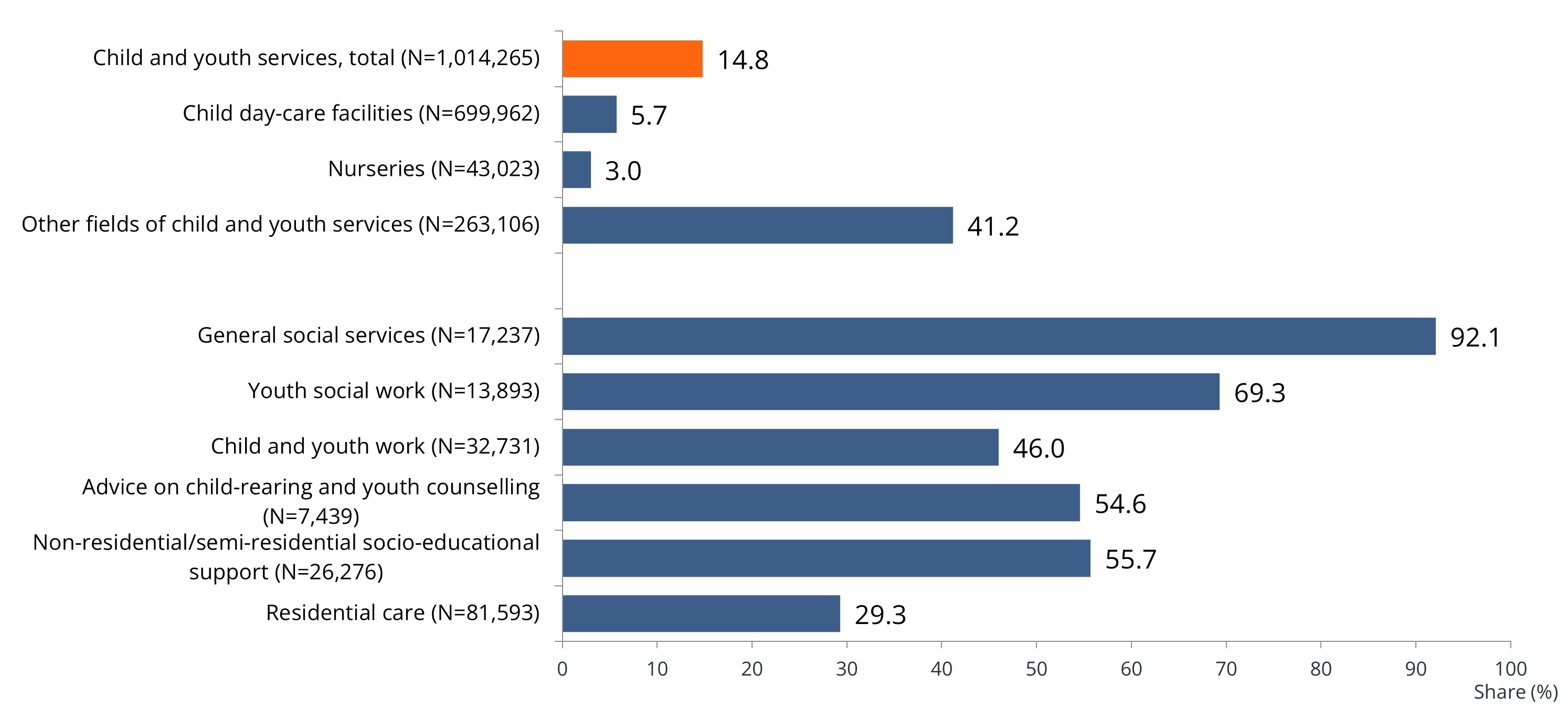Structures > Employees
Qualifications of professionals in socio-educational youth work
Professionals in the field of socio-educational child and youth work have a wide range of training backgrounds gained with universities, colleges for continuing professional development, technical schools and others besides. The share of youth work professionals with relevant university qualifications varies depending on the field of work.
Educational staff and administrative (N=951,498) with a relevant university qualification

Source: Statistisches Bundesamt: Statistiken der Kinder- und Jugendhilfe – Einrichtungen und tätige Personen ohne Tageseinrichtungen, DOI: 10.21242/22542. 2020.00.00.1.1.0; Statistiken der Kinder- und Jugendhilfe – Kinder und tätige Personen in Tageseinrichtungen und öffentlich geförderter Kindertagespflege, DOI: 10.21242/22541.2021.00.00.1.1.0; various years; compiled and calculated by AKJStat
Notes
Besides personality, being in possession of the requisite training is a central requirement for socio-educational professionals. Training can take many different forms, with an increasing trend in recent years towards greater fragmentation or specialisation. Universities, universities of applied sciences, colleges for continuing professional development, or technical schools all offer a variety of qualifications. Specialisations in different areas aim to satisfy the diversity of tasks and target audiences served.
With staffing for child and youth services undergoing dynamic expansion over the last few years (see notes on Fields of work of child and youth services professionals), it is interesting to consider how the qualifications of child and youth services professionals have evolved throughout this period. One helpful indicator in this regard, in particular given the ongoing debate on the need to "academicise" child and youth services, is the degree of professionalisation that has taken place, i.e., the share of people working in this sector with a relevant university degree. Academic qualifications include bachelor's and/or master's degrees in social work (in Germany these are typically: Dipl.-Sozialpädagog*in, Dipl.-Heilpädagog*in, or Dipl.-Pädagog*in, with a certificate from a university or university of applied sciences, or an officially recognised qualification as Kindheitspädagog*in including a bachelor's/master's). Depending on the field of work, the share of youth work professionals with a relevant university degree can vary considerably.
Child day-care
In 2019 child day-care facilities made up the area of child and youth services with the lowest share of staff (just under 6%) with a relevant academic qualification by quite a margin. However, a university education is not generally a requirement for child day-care workers. The predominant qualification in this field is that of an early years educator, or Erzieher*-in, with 66% of professionals holding this title. This number has risen slightly in recent years with the addition of more university courses in early childhood education and a greater focus on candidates' academic qualifications when filling certain positions, including leadership roles.
Unlike in child day-care facilities, no specific academic qualification is necessary in order to work as a nursery assistant, but staff are generally required to attend a basic training course of at least 160 hours in duration. In 2019 73% of nursery assistants had received this basic training and a total of 3% had a relevant university qualification.
Socio-educational support services
Just over one in three people (38%) working in socio-educational support services has a relevant academic qualification. The exact number varies according to the specific field: in 2018 around 30% of professionals working in residential care had a relevant academic qualification; this remains well below the share in non-residential/semi-residential care (57%) and parental counselling (54%). In the case of parental counselling, a further 35% and thus a particularly large share of professionals have another university degree, usually with a psychology specialism.
Child and youth work
The skills profiles of child and youth work professionals are incredibly varied, with backgrounds in everything from socio-educational training to housekeeping to art. At the end of 2018, it was generally the case that child and youth work professionals had completed professional training or a university qualification. Of the 32,100 or so individuals recorded, at the most recent count around 45% held a relevant academic qualification, generally speaking from a university of applied sciences.
Youth social work
A large portion of employees working in youth social work – with the exception of residential youth social work – have completed a degree in a socio-educational subject. For example, in 2018 around 85% of school social workers had obtained a university degree and hence attained a similar level of education to the teaching staff alongside whom they work.
General social services
The general social services department (ASD) has one of the highest shares of employees in the child and youth services field with an academic qualification: 92% in 2018.
Further reading
- Mühlmann, Thomas/Olszenka, Ninja/Fendrich, Sandra (2020): Das Personal in der Kinder- und Jugendhilfe – ein aktueller Überblick. In: KomDat Jugendhilfe, issue 1, p. 1–6.
- Fuchs-Rechlin, Kirsten/Rauschenbach, Thomas (2019): Neue Herausforderungen, neue Kompetenzen? Sozialer Wandel und die Konsequenzen für die Professionalisierung. In: AGJ (ed.), Ohne uns geht nichts! Fachkräfte in der Kinder- und Jugendhilfe. Berlin, p. 44–64.
- Kunhenn, Jacqueline/Oelerich, Gertrud (2019): Fachkraft – Fachkräftegebot. In: AGJ (ed.), Ohne uns geht nichts! Fachkräfte in der Kinder- und Jugendhilfe. Berlin, p. 35–43.
- Statistisches Bundesamt (2022): Statistiken der Kinder- und Jugendhilfe. Kinder und tätige Personen in Tageseinrichtungen und in öffentlich geförderter Kindertagespflege as at 1 March 2022 (last accessed: 1 July 2023).
- Statistisches Bundesamt (2022): Statistiken der Kinder- und Jugendhilfe. Einrichtungen und tätige Personen (ohne Tageseinrichtungen für Kinder) 2020 (last accessed: 1 July 2023).


